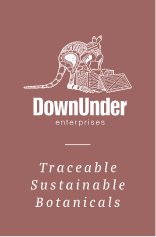Down Under Enterprises grows, produces, exports, and markets traceable
and sustainable native Australian essential oils and botanicals grown on our farm, Buhlambar, and from across Australia offering essential oils and botanicals with unique functional and aromatic properties.
G’day mate,
Welcome to our July newsletter for 2023. This month we are talking about greenwashing, sorting the laundry of blue, black, purple, and even rainbow washing.
Consumers are increasingly taking note of the misleading marketing tactics employed to present products, and even companies, as environmentally friendly or sustainable.
Now Regulators around the world are taking note as well - and beginning to invoke significant penalties on the most egregious washing practices and Sustainability claims. Consumer and Regulator actions are reshaping the business landscape, driving genuine change. The goal is to create a global environment where Sustainability is not just a buzzword, but a tangible commitment to doing better.
Increasingly, supply chains will need to adapt to incorporate solid ESG credentials. Read on to learn how Down Under is helping our customers with tangible sustainability evidence to support their product claims.
Read on:
• ESG Washing: Sorting the Colors
• Take the Spot the Greenwashing Quiz
• Traceability - the New Clean
• Your Green Claims, Our Evidence
Enjoy!

Phil Prather
FEATURED "PRODUCT"
Mind the green gap
Greenwashing refers to the deceptive marketing practices companies employ to portray themselves as environmentally friendly or sustainable. While in reality, their actions may not align with their claims. Regulatory bodies and governments worldwide have recognized the need to address greenwashing and vague Sustainability claims, taking a firm stance to prevent such information from misleading consumers and investors.
Pressured to “greenwash”?
Cone Research (2019) found that 83% of Americans said they feel better about companies making bold environmental commitments, and 39% said they had researched a company’s support of social and ecological issues. Meanwhile, 61% of Americans say they are confused by the terms companies use to talk about efforts to solve the climate crisis. It’s not just consumers taking a magnifying glass to green claims. Companies are feeling pressure from investors, governmental regulators, and independent ranking and rating organizations to be greener.
Greenwashing relies heavily on companies trying to convince consumers that their products are sustainable. While market research consistently identifies Gen Z as caring the most about the planet of any generation, this generation of consumers is also most on guard for inconsistency in messaging. A 2021 survey by McKinsey found 88 percent of American Gen Z’ers do not trust brands’ environmental, social, and governance (ESG) claims.
| 83% | 61% | 88% | 68% |
|
Americans feel better about companies making bold environmental commitments. |
Americans are confused by the terms companies use to talk about how they are solving the climate crisis. |
American Gen Z’ers don’t trust brands’ environmental, social, and governance (ESG) claims. |
Green claims have no meaningful or accurate evidence as published by Consumer Policy Research Centre Australia. |
It's not just consumers who feel confused; marketers and brands feel the same. Many brands are doing the right thing but are struggling to suitably showcase their efforts on the packaging. About 50% of marketers express concern about being accused of ‘greenwashing’ in their attempt to promote legitimate sustainability efforts. The Chartered Institute of Marketing has recently shed light on the dilemma confronting marketers aiming to showcase their sustainability efforts, citing 50% of surveyed marketing executives express concern about being accused of 'greenwashing.’
Perhaps a result of this dilemma, more brands are ‘green hushing’ or ‘green silencing’, which means they are scared to talk about their sustainability work for fear of being called out for greenwashing, and/or increased regulatory scrutiny. Sustainability consultant South Pole reports 67% of surveyed companies voluntarily stopped publicizing their ESG efforts.
ESG Washing: Sorting the Colors
Businesses, large and small, are increasingly recognizing the growing requirements of Environmental, Social, and Governance (ESG) practices as sustainability becomes a business imperative - no more a flashy buzzword. Companies now prioritize ESG factors to enhance their reputation, attract employees as well as consumers, and also access investors. However, this need to show ESG credibility is also driving poor business practices amongst those in the blind pursuit for profit. These companies attempt to cover up their ESG deficiencies with various forms - colors – of corporate sustainability washing.
How many colors can you sort?
Greenwashing
Greenwashing is the deceptive practice of making exaggerated or false claims about a company's environmental friendliness or sustainability efforts. It misleads consumers about sustainability practices and creates a false image of responsibility.
Bluewashing
Bluewashing is when companies join the UN Global Compact to enhance their brand credibility without making significant efforts and initiatives to fulfill their social reporting obligations. The blue refers to the color of the UN flag. It is similar to greenwashing but focuses more on economic and community factors, typically linked with reference to the UN Sustainable Development Goals (SDG’s).
Blackwashing
Blackwashing involves exploiting racial equality issues for marketing without genuine support. Companies use diversity initiatives, like ethnic minority issues, as a facade, potentially distracting from other business practices that may not align with proclaimed values.
Purplewashing
Purple-washing refers to deceptive marketing or co-opting strategies that use feminist themes or symbols to create a positive image for a company or organization while failing to genuinely and substantively address gender equality or support feminist causes.
Rainbow-washing
Rainbow-washing uses LGBTQ+ symbols and references for marketing without advocating for LGBTQ+ rights. Companies exploit Pride events with rainbow flags while neglecting real support or failing to address LGBTQ+ issues within their own organization. It trivializes the struggle for equality and inclusion.
Overloading the Wash
A recent evaluation of greenwashing in the European Union (EU) revealed that almost half of “green online claims” made by companies were found to be exaggerated, deceptive, or entirely false. Such alarming statistics have prompted legal actions in Europe and across the globe.
Furthermore, a new EU Directive is being considered, which may restrict environmental performance claims that lack substantial evidence.
In Australia the competition watchdog, Australian Competition and Consumer Commission (ACCC), has recently prioritized a crackdown on greenwashing practices.
In late 2022, the Australian Consumer Policy Research Centre investigated how much greenwashing was happening in Australia on any given day. The result of their investigation wasn't great. Researchers identified the number of green claims an average Australian sees in a day, through a combination of online, offline, at shops, or on public transport. They reported an average of 122 green claims across 17 sectors, but they also found that 69 percent of those claims lack supporting evidence or verification.
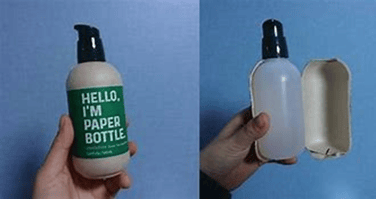
A cosmetics brand launched a beauty product in a "paper bottle" as part of a broader brand initiative to reduce plastic packaging. In April 2021, a customer discovered that it was simply a plastic bottle wrapped in paper, prompting social media outrage and an apology from the brand.
Avoiding the Wash
According to a retail sweep by the ACCC, the personal care sector has the highest percentage of concerning green claims.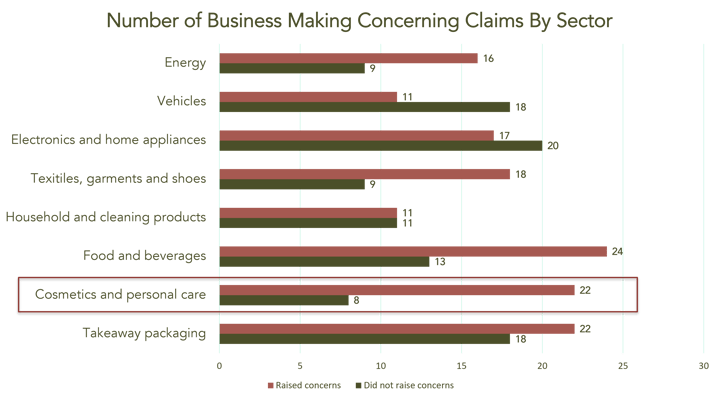
Many of the sustainability claims made were classified as are very deceptive.
The research report by the Consumer Policy Research Center highlights some real time cases and common pitfalls when they swept the shops in Australia. Here are some standout examples:
.png?width=210&height=213&name=MicrosoftTeams-image%20(10).png)
Absurd Claims
Claims lack of specific action or impact through the consumption of the product.
.png?width=210&height=252&name=MicrosoftTeams-image%20(11).png)
Contradictory
Claims on disposable products about low resource use and recyclability can be questionable with little to no evidence.
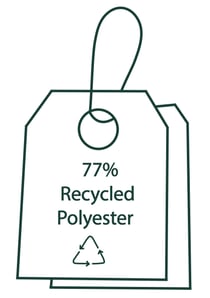
Oddly specific
Claims deemed to be too specific could be making a selective disclosure, shifting the focus of customers to only look at one aspect, and in the process, losing the overall environmental impact of the product.
A “Green” Glossary - think twice before useThe ACCC lists specific broad or unqualified claims that can be problematic without substantive evidence:
|
Spot the Washing
Take our 7-question quiz and see how well you can spot the greenwashing.
IN THE NEWS
Regulators Narrow the Green Gap
The good news: regulatory pushback against greenwashing is improving. The onus should not be on consumers to verify claims or spend hours researching sustainability claims they encounter.
Although many countries now have legal frameworks for greenwashing, several countries have taken extra steps to regulate greenwashing practices and improve consumer law protections. An analysis by AMPLYFI illustrates that much of the world has regulations in place against greenwashing, with the US, EU, UK, and Australia leading the way.
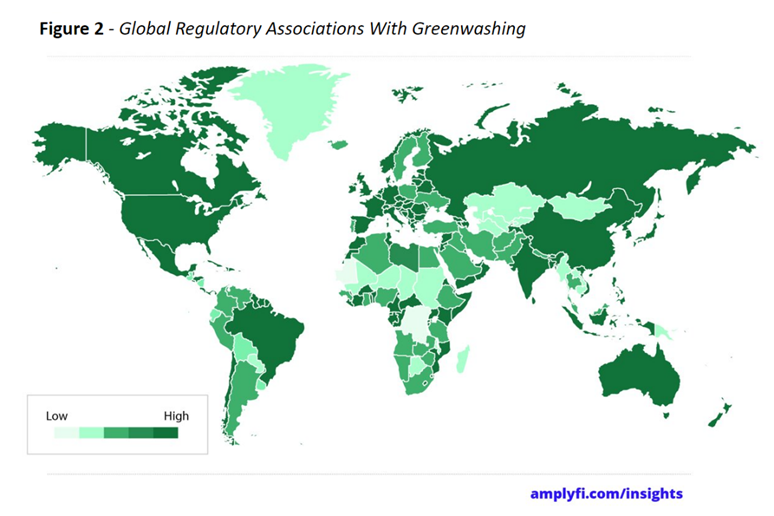
Australia
Australian Securities and Investments Commission (ASIC) has been closely scrutinizing sustainability and other ESG claims lately.
In February 2023, ASIC sued Mercer Superannuation in its first greenwashing prosecution. Mercer marketed one of its investment funds, Sustainable Plus Investment Options, as suitable for members who are “deeply committed to sustainability”, vowing to exclude investments in companies involved in alcohol, gambling, and carbon-intensive fossil fuels. However, ASIC discovered Mercer’s fund had holdings in nearly 50 companies that should have been excluded: 19 companies in gambling, including Aristocrat, Crown Resorts, and Tabcorp; 15 companies involved in fossil fuels, including AGL, BHP, Whitehaven Coal; and 15 involved in alcohol production, including Budweiser, Carlsberg, Heineken, and Treasury Wine Estates.
Another federal regulatory body, Australian Competition and Consumer Commission (ACCC) has also been cracking down on greenwashing, publishing their draft guidance on 14 July 2023. The proposed penalty could be up to 30% of a corporation’s annual turnover.
On 25 July 2023, ASIC took billion dollar investment fund Vanguard to court for the second time over greenwashing claims. We have yet to hear the outcome of this legal action.
United States
Similarly, the United States has seen increased attention to greenwashing. Several consumers class action lawsuits involve greenwashing statements.
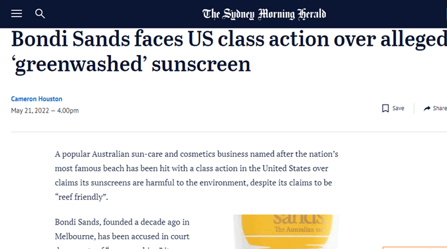
Australian brand Bondi Sands was hit with a lawsuit in 2021 for falsely claiming its sunscreen was ‘reef friendly’ without adequate definition and no third-party certifications.
On the legislative enforcement side, the Federal Trade Commission (FTC) has been actively monitoring and taking action against companies making false or unsubstantiated environmental claims. The FTC recently updated its Green Guides, guidelines for companies on claims around ‘recyclable, degradable, and carbon offsets.’ In the news recently, FTC has taken Walmart and Kohl’s to court seeking the largest-ever civil penalty of $5.5 million over deceptive green claims ‘free of harmful chemicals, using clean nontoxic materials’. While in reality, the contentious products are purported to contain toxic chemicals and pollutants.
European Union
In Europe, the European Union has introduced the Sustainable Finance Disclosure Regulation (SFDR), which requires financial market participants and advisors to disclose information regarding the environmental sustainability of their products. The SFDR aims to promote transparency and prevent misleading green claims.

Staying in Europe, France introduced one of the world’s first and one of the strictest anti-greenwashing laws in 2021. The fine can be up to 80% of the campaign cost whenever misleading commercial
practices are based, and requires a 30 day clarification to be prominently featured on the company website.
United Kingdom
The British Advertising Standards Authority (ASA) slammed Persil, the market leading Unilever laundry detergent in August 2022 for misleading and unsubstantiated claims.

In May 2023, the ASA announced commencement of stricter enforcement around the use of terms such as “carbon neutral”, “net zero,” and “nature positive” as part of a greenwashing crackdown. These regulations are expected to kick-in later this year with updated rulings.
The Need for Global Cooperation
At this point in time, the global regulatory landscape for greenwashing is still fragmented. Different countries have varying degrees of regulation and enforcement, leading to challenges in creating a cohesive global framework. However, harmonization of regulations and increasing international cooperation among regulatory bodies is coming. These actions are deemed crucial to effectively combat greenwashing on a global scale.
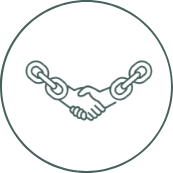
TRACEABILITY
Traceability is the New Clean
Traceability can play a significant role in verifying sustainability product claims.
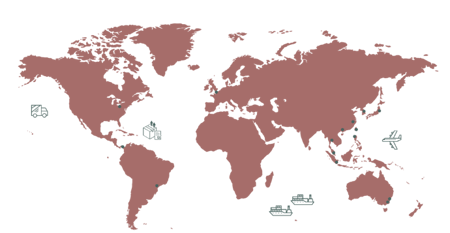
Researchers from The Chinese University of Hong Kong discovered a positive link between a genuinely green supply chain and capital market valuation in the long term. Still, the first mover advantage is much more significant than for late comers.
Although 68% of the 1000 surveyed supply chain executives stated they recognize the importance of end-to-end transparency and visibility, only 8% are addressing the issue, according to Capgemini Research Institute Sep 2022.
One significant factor is the significant amount of documentation and verification required to code a new supplier, even for an existing ingredient. Internal procedures designed to assure consistency of quality and supply are, perversely, having a restrictive impact on changing suppliers to gain greater traceability.
Global consultancy Bain & Co. prepared a White Paper for the World Economic Forum entitled, “Digital Transparency: A Framework for More Sustainable and Resilient Value Chains”, which cites a traditional “us vs them” mentality for buyer: supplier relationships. Bain’s report identifies a key enabler to traceability efficiencies is to develop a supplier “collaboration” strategy. Our own experience tells a similar story. Those customers forging close collaborations with us are benefitting from supply chain traceability, reliability and consistency of product, cost savings discussions, and new product ideas.
But collaboration is only part of a bigger journey to Traceability. Bain’s study cites three additional enablers which, together, form a complete Supply Chain Transparency program.
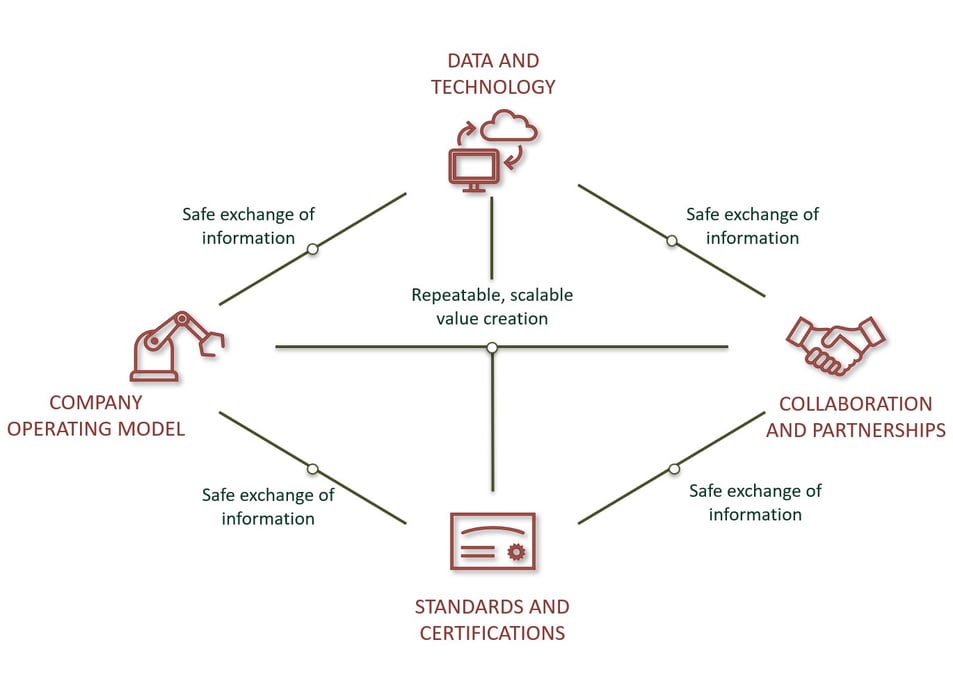
Digital Traceability: A Framework for More Sustainable and Resilient Value Chains, Bain & Co, World Economic Forum, 2021.
Down Under Enterprises’ traceability systems, certifications, and business model enable visibility of our products back to their origins. For example, through our batch number, our systems enable visibility back to the specific field on our farm from which the batch originated. Our dedication to traceability ensures complete transparency and allows you to have a deeper understanding of your ingredient source and journey from our farm to your facility.
Our focus on traceability is built into our complete production process. For every kilogram of essential oil we produce, we meticulously document the entire journey, from production to delivery, generating extensive data.
This commitment ensures transparency and allows us to maintain the highest standards of quality and sustainability throughout the entire process. The veracity of these systems and processes are recognized with key certifications like EcoVadis Platinum, ISO14001, and B Corp.
As the world progresses to tracing sustainability measures, including total GHG footprint , Down Under Enterprises’ team and systems are ready.
Click to LEARN MORE about how Down Under Enterprises can help to achieve end-to-end supply chain traceability for your supply chain to gain the first move advantage.
THE EVIDENCE
Your Claims, Our Evidence
To make progress in tackling the sustainability challenge, any claims need solid evidence. This requires businesses to be open and transparent about their sustainability impact, including their environmental footprint. A strong, sustainable value proposition enables companies to achieve greater strategic freedom, ease regulatory pressure, and help reduce companies’ risk of adverse government action.
However, research finds that 49% of marketers admit they lack relevant sustainability training and are uncomfortable working on sustainability campaigns.
Down Under Enterprises has helped many customers with evidence to support their sustainability claims for products containing our ingredients.
Our team loves sharing our journey and providing details to our customers to support evidence based sustainability claims. For example, our Regenerative Farming Statement helped one of our customers substantiate their label claims and gain retail shelf space with Whole Foods Market in the US.
Our certifications, such as EcoCERT, COSMOS, USDA NOP, and B Corp, can help your brand tell its story about the importance you place on quality ingredients, supplier relationships, and traceability. These credentials may also assist with claim substantiation of your formulated product.
Tap our team’s deep experience with these certifications and our ingredients. CONTACT US and talk with our experienced staff to discuss how our sustainability experience can bring together likeminded businesses to achieve even more sustainable practices.
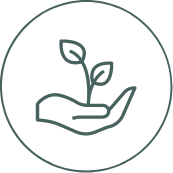
FARM UPDATES
Buhlambar Farm Biodiversity Register
At our Buhlambar Farm, efforts to rewild our non-production areas are cultivating a diverse - and expanding - range of native species on our land. And to keep track of all the fantastic creatures and plants that call our farm home, we created the Buhlambar Farm Biodiversity Register.
Our Biodiversity Register is a living, breathing record of all the species that grace our farm across the seasons. From chirpy birds to scaly reptiles, we document them all. And on our production paddocks, we've opted for a variety of native Australian botanicals, providing a buffet of food and shelter for our diverse native residents.
We've built cozy nesting boxes for small animals, ensuring they have a safe and comfy place to call home. We've also planted over 3,000 trees along our Koala corridor, creating the perfect hangout spot for these cuddly creatures and other tree-dwelling animals like sugar gliders and microbats.
We use our Biodiversity Register to understand the health of our farm's ecosystem and make informed decisions about our management practices and, importantly, to keep sharing stories of these visitors with you.
READ our blog for more about our Biodiversity Register.










EMPLOYEE'S PROFILE
Introduction of Kyanne
This month, the spotlight goes to Kyanne. She is the new addition to our North American Team as Business Development Manager, West Coast. We sat down with Kyanne to learn of her background and interests.
What did you do before joining the team at Down Under?
I have been in the natural product industry for nearly a decade. My previous role was as a purchasing director, buyer and regulatory compliance manager at a US based essential oils distributor. My previous job’s focus was on raw bulk ingredients for high end skin care, aromatherapy, and natural perfumery. I have also studied organic skincare formulation at Formula Botanica and have experience creating a myriad of different products including lotions, creams, toners, cleansers, body oils, scrubs, and masks. Needless to say, I have a long-term passion for beautiful pure and natural plant-based ingredients and how they can be used to create a beautiful final product.
What attracted you to the natural products industry?
I have long been fascinated by the therapeutic applications of plants. After college I decided to take a bit of left turn away from my degree in Art and Design and attended a school for herbalism in Northern California. It was at the California School for Herbal Studies where I first learned about essential oils and hydrosols and how they could be used for both their aromatics and therapeutic applications. I even have a small still and have grown and distilled my own plants, albeit on a very small scale.
What is it about Down Under that motivated you?
What really attracted me to Down Under was that they are farmers first and foremost. I really wanted to work with a company that had a very close connection with the plants themselves as well as to where their products are grown and manufactured. Down Under Enterprises is doing everything I always wanted from all of the vendors at my previous job. Their quality is unsurpassed, they have all the documentation I could ever have asked for, a ton of information on the potential therapeutic uses of their oils, and beautiful marketing materials and background stories on many of their products. And most importantly, they are one of the most ethical companies I have ever worked with and are doing everything they can to promote sustainable practices for both planet and people. These days, many consumers (including me!) are very concerned about where their products come from and how they are made. Down Under is truly ahead of the curve compared to most essential oil suppliers I have worked with in the past in that they provide the kind of transparency consumers now want.
What do you love most about what you do?
My favorite part about my job is inspiring my customers and getting them excited to use native Australian botanicals. Many companies utilize the same handful of essential oils and I think Australian natives have so much potential in terms of their very unique aromas and potent therapeutic properties. Not only that, but using plants grown sustainably in their endemic environment helps support biodiversity.
What’s your favorite way to spend the weekend?
I grew up in a small beach town and it has instilled in me a love of bodies of water in all their forms. Oceans, lakes, rivers, you name it! I equally enjoy travelling to tropical oceans and wild mountain lakes in the Sierras. My favorite way to spend the weekend is lounging in the sun by the ocean and swimming with dear friends. Ideally margaritas would be involved as well!
Our story
Down Under Enterprises grows, produces, exports, and markets traceable
and sustainable native Australian essential oils and botanicals grown on our farm, Buhlambar, and from small growers across Australia producing unique essential oils and botanicals from plants native to Australia.
